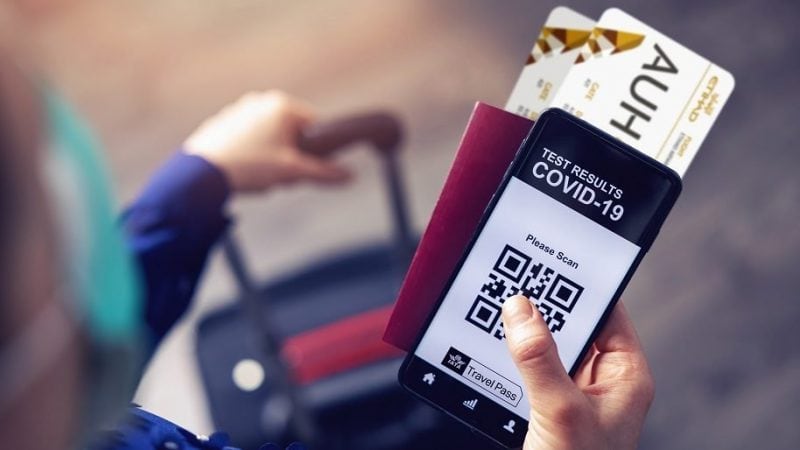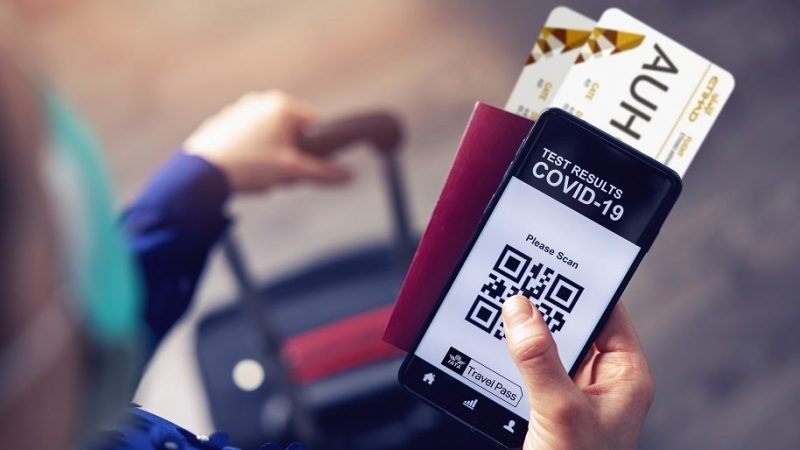Travel Health Apps Take Flight
With testing requirements and vaccinations becoming part of everyday travel life, verification solutions are gaining momentum
January 29, 2021


Now that effective COVID-19 vaccines are rolling out in many parts of the world, and with testing becoming a regular feature of pandemic era travel, attention is turning to how travelers can prove they are free from, or protected against, the deadly virus which has claimed more than three million lives worldwide.
An idea gaining traction in travel circles revolves around some kind of ‘digital health passport, which would document the health status of travelers, keeping record of both vaccination and negative COVID tests. Such a solution would probably take the form of an app on smartphones, and would have to be recognized by individual governments to allow international travel.
Several different companies and international bodies are suggesting a variety of technological solutions at the moment to document and verify travelers’ health status. Here are some of the different “passport” solutions that are currently undergoing trials.
IATA Travel Pass
Who’s behind it?
The International Air Transport Association has designed a digital health pass called Travel Pass that the organization says will support the safe reopening of borders.
How does it work?
The mobile app contains information required by many governments. The pass enables authorized labs and test centers to securely share test and vaccination certificates with passengers. Passengers can then create a digital passport and share testing or vaccination certificates with airlines and authorities to facilitate travel. In effect the Travel Pass contains the information to verify whether a passenger is eligible to undertake their travel journey.
Where is it available?
Singapore Airlines launched the initial trials of the IATA Travel Pass framework in December on flights from Jakarta and Kuala Lumpur to Singapore.
Gulf carriers Etihad Airways, Emirates and Qatar Airways have also signed on to introduce Travel Pass. Etihad will offer guests the pass on selected flights from Abu Dhabi in the first quarter of 2021, and if successful, roll this out to other destinations on the airline’s network.
Emirates will launch the pass in April for customers traveling from Dubai. Travelers will be able to share their COVID-19 test status directly with the airline before reaching the airport through the app.
Qatar Airways will begin trials of the app on its Doha-Istanbul route in March.
Is my data secure?
IATA says that the Travel Pass “will keep passengers in control of their data and facilitate the sharing of their tests with airlines and authorities for travel.”
Individual Airline Apps
In addition to the IATA Travel Pass framework, a number of airlines have introduced health record keeping features in their own apps. Among them:
Air Asia has developed Scan2Fly in partnership with analytics company GrayMatter. Passengers are prompted to provide any documents required by the destination country. Then they need to scan and upload medical certificates at the time of online check-in. AirAsia analyzes the documents in real-time and either approves or rejects the travel status.
The technology has already launched on routes from Kuala Lumpur to Singapore, Surabaya and Jakarta. Graymatter states that its cloud-hosted system is “equipped with robust information security.”
In November, American Airlines introduced Verifly, a mobile app developed in partnership with Daon, an identity assurance software company. The app shows testing and documentation requirements for the passenger’s destination, and verifies the traveler’s data matches the country’s requirements in real-time.
After it ran trials in December, the carrier announced that it was expanding access to VeriFLY for travel from all international destinations in response to the CDC’s recently announced mandate that all inbound arrivals to the US must verify a negative COVID-19 test result before departing.
More recently, United Airlines launched its Travel-Ready Center, a digital solution that allows customers to upload required testing and vaccination records integrated into the airline’s mobile app and website.
In the Travel-Ready Center, customers can upload and validate test results, review local entry requirements, find testing providers, and store vaccination records that may be necessary for any for domestic and international travel, all in one place.
AOKPass
Who’s behind it?
The International Chamber of Commerce (ICC) has collaborated with International SOS and the SGS Group to create this digital, secure and portable copy of medical records.
How does it work?
Once individuals have medical results, they can enter the information into an app to create a pass. A unique code is generated and shown to the individual and their medical practitioner for them to verify the information. They will then be able to show the QR code for verification at airports.
Where is it available?
Successful trials took place on flights last year between Abu Dhabi and Pakistan. Since then, Alitalia has begun a pilot program to digitize COVID-19 rapid antigen test results via the passport for flights from Rome to New York.
Passengers traveling to Singapore from Indonesia and Malaysia can also use the pass to show their COVID-19 test results at dedicated immigration lanes at Changi airport. International SOS states that this will be rolled out to other international travelers “in the coming months.”
Etihad recently announced that it will pilot the ICC AOKpass on routes between Paris and Abu Dhabi.
Is my data secure?
The AOKpass states that medical records are stored only on your device and will not be shared or stored elsewhere. The pass is verified without the need to show any personal or medical information, and travelers can “choose when and where to share [their] information.” The information is secured using a “hashing algorithm so that it can’t be read by anyone else.”
CommonPass
Who’s behind it?
The Commons Project has partnered with the World Economic Forum to launch this digital health passport.
How does it work?
Lab results and vaccination records are accessed through existing health data systems, national or local registries or personal digital health records such as Apple Health and CommonHealth. Individuals must to consent to the information being used to validate their COVID status. The technology then assesses whether the results and records come from a trusted source and whether they satisfy the health screening requirements of the country the passenger wishes to enter. There’s a simple yes/no answer to whether the individual meets the entry criteria. Travelers receive a unique confirmation code that they can show at the airport to board the flight. CommonPass also states that those who lack smartphones will be able to print off a confirmation code and show it at the airport.
Where is it available?
The first trial flights were completed in October with Cathay Pacific between Hong Kong and Singapore, and United Airlines between London and New York. Since then, carriers including Jetblue, Lufthansa, Swiss and Virgin Atlantic have run trials of the technology.
Is my data secure?
CommonPass states that it won’t reveal “any other underlying personal health information” and that Apple Health and CommonHealth “let individuals store their health records securely and privately on their phones, entirely under their control.”
Health Pass by Clear
Who’s behind it?
The airport biometrics provider Clear has moved into the public health arena in the US, launching a Health Pass within its mobile app.
How does it work?
This service is designed for businesses to keep employees and customers safe. First, users must add an ID and verify their identity with a selfie. They can then complete a real-time health survey and upload COVID-related lab results directly from an approved lab provider. Once at a participating location, users should go to the Clear pod and undergo a temperature scan, and then show or scan their health pass (either by facial recognition or a QR code) to gain access to the location. The pod will show a red or green light to denote whether the user has passed or failed the screening.
Where is it available?
The Health Pass is being assessed by restaurant group Founders Table, with employees using the app for daily health screenings before beginning work. Clear has also launched a three-month trial partnership with the 9/11 Museum in New York to use the app to screen its staff for the virus.
Is my data secure?
The specific answers to survey questions or any specific test results are not provided to third party partners or employers.
IBM Digital Health Pass
Who’s behind it?
IBM Watson Health has designed a digital wallet product for smartphones.
How does it work?
The product enables organizations to verify health credentials for employees, customers and visitors entering their site based on their own set of criteria. This might include COVID-19 test results, temperature scans and vaccination status. It aims to “bring people back to a physical location, such as a workplace, school, stadium or airline flight.”
Where is it available?
At the moment, the US National Institutes of Health and Salesforce have both signed on to test IBM’s pass. Salesforce will provide individuals with “a verifiable and privacy-preserving way to manage and share their vaccination and health status in the wake of the COVID-19 pandemic” via its Salesforce Work.com platform.
Is my data secure?
IBM states that the encrypted digital wallet allows individuals to “control what they share, with whom and for what purpose.” The company adds that, through the use of blockchain technology, the health pass can be “verified, trusted and tamperproof.”
The Mvine-iProov passport
Who’s behind it?
iProov, a provider of secure biometric authentication technology, has partnered with cyber security group Mvine to launch this passport. It is also backed by Innovate UK – a non-departmental public body funded by a grant from the UK government.
How does it work?
This technology enables people to register a test result or vaccination status without disclosing their identity. The medical professional administering the vaccine will be able to create the online certificate using a phone or tablet and then ask the user to have a selfie added to their electronic certificate.
The technology “does not discriminate against people based on the kind of smartphone they own, and there is a route for people who do not possess smartphones” – i.e. a card-based method.
Where is it available?
It is currently being tested by Directors of Public Health within the UK’s National Institutes of Health, with two trials expected to be completed by March 31.
Is my data secure?
The certificate is completely anonymous and “does not need to include the name, address, NHS number or any other identifying information about the person.” When the person wishes to present their certificate, they show for example a QR code and merely need to verify their face against the image attached to their online certificate using any mobile phone or tablet equipped with the app. According to the providers, “an individual therefore cannot be verified without their knowledge and consent… Apart from the certificate number and the biometric, no other identity information is required or stored online.”
Vaccination Credential Initiative (VCI)
Who’s behind it?
A coalition of health and technology partners including Microsoft, Oracle and The Commons Project.
How does it work?
It aims to allow individuals to access to their vaccination records “in a secure, verifiable and privacy-preserving way.” The coalition is developing standards for organizations administering vaccines to make credentials available in an accessible, interoperable, digital format.
Individuals will obtain an encrypted digital copy of their vaccination records to store in a digital wallet of their choice. VCI also said that people could receive printed QR codes with verifiable information.




